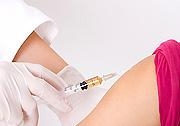Cancer vaccine's added benefit
Vaccination against the virus that causes cervical cancer has had an additional benefit - a marked decline in cases of genital warts, a new study has found.
Vaccination against the virus that causes cervical cancer has had an additional benefit - a marked decline in cases of genital warts, a new study has found.

Vaccination against the virus that causes cervical cancer has had an additional benefit - a marked decline in cases of genital warts, a new study has found.
The human papillomavirus (HPV) vaccine, which has been available since mid-2007 to all females between 12 and 26 years, gives protection against four strains of HPV, two of which cause genital warts.
A study carried out by UNSW's National Centre in HIV Epidemiology and Clinical Research (NCHECR) found the vaccine has had a population-level impact on rates of genital wart infections.
The number of women aged under 27 resident in Australia who were diagnosed with genital warts had declined by 60 percent since 2007, the researchers found
There was no decline in warts among older women or among men who have sex with men - groups which were not eligible for the government-funded vaccination.
The researchers pooled data from eight sexual health clinics Australia-wide, covering 110,000 new patients in the period 2004 to 2009.
About 6,000 new cases of genital warts were detected and analysis revealed a 60 per cent drop-off among women aged under 27.
Heterosexual men experienced a smaller but significant decline of just over 30 percent, probably due to "herd immunity" stemming from the vaccination of their sexual partners, the researchers said.
"Genital warts are distressing to the patient, as well as being difficult and expensive to treat," said the head of the Sexual Health Program at NECHECR and the study's principal investigator, Professor Basil Donovan.
"While we knew from clinical trials that the vaccine was highly effective, Australia is the first country in the world to document a major benefit for the population as a whole," he said.
The findings have been presented this week at the International HPV Conference in Montreal.
Contacts: Professor Basil Donovan, NCHECR | 9385 0900 or 0405 143 061|Professor Andrew Grulich, NCHECR | 0414 385 317|